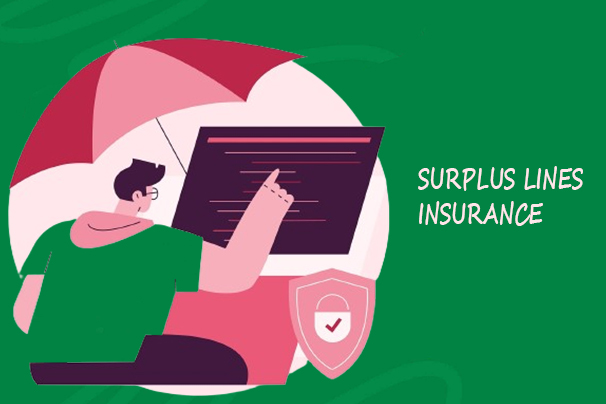Surplus lines insurance occupies a unique niche within the broader insurance landscape, offering a vital solution for risks that traditional markets are reluctant or unable to insure. This specialized form of insurance comes into play when businesses or individuals face complex, high-risk situations that standard insurers deem too unpredictable or hazardous to cover under regular terms.

Surplus lines insurers, with their ability to customize policies and take on unconventional risks, provide a safety net for those in need of coverage beyond the boundaries of the standard coverage market. By operating outside the typical state insurance regulatory framework, surplus lines insurers have the flexibility to innovate and offer tailored insurance solutions, filling gaps in the market and ensuring that virtually no risk goes uninsured.
What is Surplus Lines Insurance?
Surplus lines insurance is also known as excess lines insurance, and it is a specialized section of the insurance industry that provides coverage for risks that the standard insurance market refuses to insure. This is usually because of their nature, intricacies, or level of risk. Although these risks can be special, high, or unconventional for traditional insurers to underwrite based on their regulated policy forms and rates, Nevertheless, this insurance offers a solution for individuals and businesses looking for coverage for such non-standard risks.
How Does it Work?
This insurance operates outside the typical state insurance regulatory framework, allowing it greater flexibility in underwriting and rate setting. Before seeking coverage from a surplus lines insurer, one must typically prove that they were unable to secure coverage from licensed insurers.
This process is made easy by surplus line brokers, who are specially licensed to operate in this market. Once a risk is placed with a surplus lines insurer, the broker must adhere to state-specific regulations, such as filing documentation and paying state taxes on the premiums.
What Does Surplus Lines Insurance Cover?
The coverage of surplus lines insurance depends on the insurance provider. But this insurance can cover various risks and situations, including but not limited to:
- Professional liability for high-risk professions.
- Natural disaster-prone areas.
- Emerging risks.
- High-value properties.
- Unique or unusual properties.
- High-risk activities.
It is important to understand what this insurance policy covers to know the best time to file a claim.
What Does It Not Cover?
While surplus lines insurance can cover a broad range of risks, there are limits to what it will insure, similar to standard insurance policies. It typically does not cover:
- Standard risks.
- Illegal activities or properties.
- There are certain types of moral hazards.
Your insurance company also determines the coverage and limitations of this policy type. Thus, anything that is not mentioned in your policy will not be covered by your insurance provider.
How Much Does Surplus Lines Insurance Cost?
The cost of surplus lines insurance differs based on certain factors. For instance, consider the risk of being insured, the amount of coverage, and the terms of the policy. Because it often covers higher-risk situations, surplus lines insurance can be more expensive than standard insurance. Premiums are determined based on the nature of the risk, the insurer’s assessment of the likelihood of a claim, and the amount of coverage requested.
How to Get Surplus Lines Insurance
Getting surplus lines insurance involves a unique process due to its nature of covering high-risk or unusual exposures not typically accepted by standard insurers. Here are the basic steps you need to begin this process:
- Identify your insurance needs.
- Consult with an insurance agent or broker.
- Attempt to obtain standard insurance first.
- Work with a licensed surplus lines broker.
- Provide detailed information.
- Review quotes and policies carefully.
- Complete the purchase.
Identify your insurance needs
Pinpoint and find out the areas that you need protection against. Understanding the scope and details of your risk is crucial for effectively communicating your requirements to insurance experts.
Consult with an insurance agent or broker
Get in touch with an insurance agent or broker, with a strong preference for those skilled in managing high-risk or specialized insurance needs. Working together with an expert familiar with the surplus lines market’s nuances is important.
Attempt to obtain standard insurance first
Before considering surplus lines insurance, you generally must show that efforts to get coverage from the standard insurance market were futile. This “due diligence” phase involves your agent or broker recording these attempts, which is a prerequisite for proceeding with a surplus lines insurer.
Work with a licensed surplus lines broker
If standard insurance options are exhausted without success, your next step is to work with a licensed surplus lines broker. Surplus line brokers are specially licensed to operate in this segment of the insurance market and have access to surplus line insurers that can potentially underwrite your risk.
Provide detailed information
Be prepared to provide detailed information about your risk exposure. Surplus lines insurers will require a comprehensive understanding of the risk to assess and quote your insurance needs accurately. This may involve completing detailed applications and providing documentation that supports the nature and extent of the risk.
Review quotes and policies carefully
Once your broker presents you with quotes, review them carefully. Surplus line policies can vary significantly in terms of coverage, exclusions, and conditions. Ensure that the proposed policy meets your needs and that you understand the terms.
Complete the purchase
Choosing the most suitable policy for your situation leads to finalizing your purchase, which includes handing in all necessary paperwork and covering the premium. Payments for surplus lines insurance are usually required to be made in advance.
